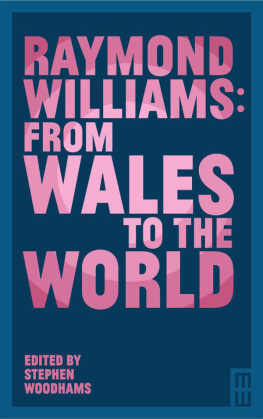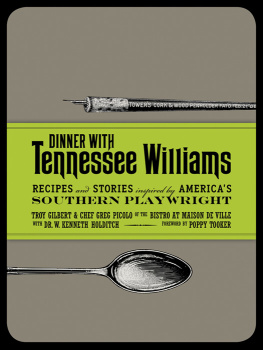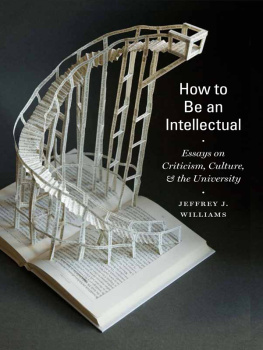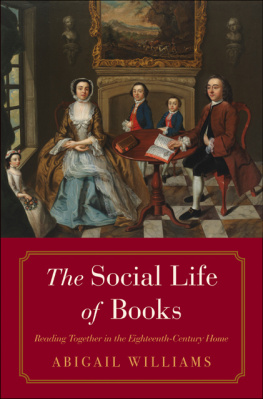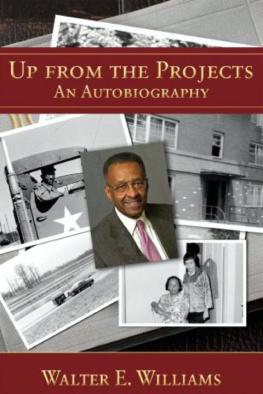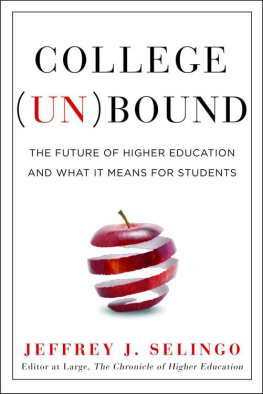2015 The University of North Carolina Press
All rights reserved
Set in Calluna
Manufactured in the United States of America
The paper in this book meets the guidelines for permanence
and durability of the Committee on Production Guidelines
for Book Longevity of the Council on Library Resources.
The University of North Carolina Press has been a
member of the Green Press Initiative since 2003.
Cover illustration: Marshals, 1855. North Carolina Collection
Photographic Archives, The Wilson Library,
University of North Carolina at Chapel Hill
Complete cataloging information can be obtained at the
Library of Congress Catalog website.
ISBN 978-1-4696-1839-5 (pbk.: alk. paper)
ISBN 978-1-4696-1840-1 (ebook)
Acknowledgments
I first discovered the richness of antebellum collegians intellectual world in several big, dusty volumes of literary society minute books in the Z. Smith Reynolds Library at Wake Forest University. As an undergraduate history major, I had no idea that these sources, and hundreds more just like them, would become the focus of my early career. But they did, and I must first thank the scholars at Wake Forest University who shaped my own pursuit of intellectual manhood, especially Simone Caron, Susan Z. Rupp, Robert Beachy, and William S. Hamilton. At the University of North Carolina, many scholars provided invaluable support. I cannot imagine a greater mentor than Harry L. Watson, who not only helped me shape, ground, and complete this book, but also provided steady encouragement during many of the most difficult moments of my life. Donald Mathews, John Kasson, James Leloudis, Heather Williams, Kathleen DuVal, Jacquelyn Hall, Mike Green, and Theda Perdue also helped me imagine this books possibilities and offered invaluable comments at critical junctures. Alfred Brophy of UNCs School of Law provided insight into antebellum literary addresses, sent copies of addresses, and read several chapter drafts. Finally, Erika Lindemann offered tremendous guidance and support. Her years of work on antebellum student writing, which are abundantly manifest in two rich collections in Documenting the American South, have been invaluable. I owe her thanks for source references, research tips, interpretations, and deep insight into James Dusenbery and his family. All of what we know about Dusenbery comes from her efforts, and Intellectual Manhood is richer because of her.
The research and writing of this book was funded in part by the Spencer Foundation, as well as the Institute for Southern Studies at the University of South Carolina. I am also grateful for the support of several other institutions. At the University of North Carolina, grants from the Center for the Study of the American South and History Department provided early research funding. The staff at the Southern Historical Collectionespecially Laura Clark Brown and Matthew Turioffered research leads and made the Southern a second home. Clark Tew provided assistance with the Dialectic Society records. I must also thank the staff at the North Carolina Collection, Special Collections Library at Duke University, North Carolina State Archives, Wake Forest University Archives, and South Caroliniana Library.
As any historian knows, support from within the wider profession is essential. I am grateful to the members of the St. George Tucker Society, who honored me with a rigorous and helpful discussion of this work. I have also benefited significantly from comments and suggestions from many scholars, whose work I greatly admire: Mary Kelley, Jennifer Green, Stephen Berry, Anya Jabour, Lorri Glover, Craig Friend, Wayne Urban, Roger Geiger, and Amy Wells-Dolan. In addition, Peter Carmichael has been a great friend during the entire process of writing this book; he provided helpful feedback, sage professional advice, and meaningful encouragement. I also owe John Mayfield special thanks. He scrupulously read a draft of this book and offered astute comments and ample encouragement that have sustained me through the daunting writing and rewriting process. His many clever phrases and ideas have enhanced this book greatly.
As I prepared this book for publication, I enjoyed support from many other colleagues. Alex Oberle made the map of UNC graduates. At the Institute for Southern Studies I had the honor of working with and learning from Walter Edgar, Mark Smith, David Moltke-Hansen, Bob Ellis, Tara Powell, Mindi Spencer, Madeline Wood, and Evan Kutzler. At Appalachian State University, I received crucial support from Michael Mayfield, Sheryl Mohn, and Sonya Long. I am also grateful to the staff at the University of North Carolina Press, particularly Chuck Grench, Lucas Church, and Paul Betz. The press secured two of the most careful and conscientious readers I could have imaginedSteven Stowe and Nicholas Syrettwhose suggestions for revision undoubtedly strengthened this book; I thank them for their kind and helpful criticisms. Finally, Eric Shramms careful editing and incisive comments greatly improved the book, and any errors in the following pages are my own.
Because this book has followed me through so many years and so many different places, I must acknowledge my historian friends from UNC and beyond: Elizabeth Smith, Tom Goldstein, Christina Snyder, Patrick ONeil, Nancy Schoonmaker, David Silkenat, Dwana Waugh, Jacqueline Whitt, Ben Wise, James Broomall, Diana DAmico, Christina Davis, John Hale, Camille Walsh, Michael Hevel, Julie Mujic, and Kanisorn Wongsrichanalai. Each of these scholars not only helped shape my work but also lightened the load with good conversation and friendship.
I must also thank my family and friends beyond academia: Andrew Williams, Margaret Williams, John and Louise Mundy, J. P. Mundy, Meg McKee, Janice McKee, and Stephanie Pavlis. Their love and support never cease to inspire and humble me. Most of all, I owe infinite thanks to Dean Mundy, whose love, enthusiasm, confidence, humor, and patience have sustained me through the entire process of researching and writing this book. He is also an amazingly gifted scholar and writer. He read every word I have written on this subject, and at every stage of the process tried to convince me that everything would turn out just fine. I cannot imagine having written this book without him.


